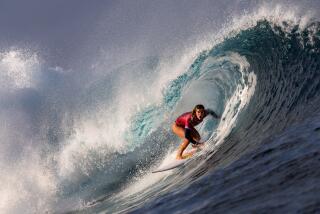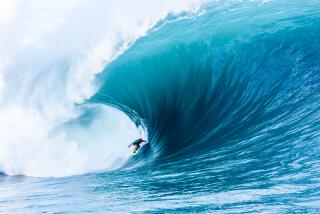RISKY BUSINESS
- Share via
A quick look at his bio in the Assn. of Surfing Professionals media guide and it’s obvious Shane Beschen is a man for all seasons. He surfs in the spring, summer, fall and winter:
What inspires you--The feeling you get from surfing.
Training--Surfing and stretching.
Interests outside of surfing--Snowboarding and surfing for fun.
Beschen, ranked No. 2 on the ASP World Championship Tour, vividly recalls the moment he devoted his life to surfing. He was 11, surfing with buddies at T-Street, the San Clemente beach around the corner from the house where he grew up, when he saw former world champion Martin Potter turn his board 360 degrees on a wave. Up the face, across the lip and down with the cascading foam.
“We both saw it from different angles,” said Dan Kennedy, a boyhood friend also in the water that day, “and it changed our lives. It was like, ‘Wow, you can do that on a wave?’ We still talk about it all the time.”
Beschen spent much of the next year trying to learn the maneuver. He had a videotape of Shane Horan pulling one off in the finals of the 1982 Op Pro in Huntington Beach and he played it over and over. Then he ran down to the beach and tried to copy it.
He spent hours every day plying the peaks of T-Street and mastered more than a few other tricks along the way. By the time he was a high school junior, he was making a nice little income as a professional surfer, always testing the limits of gravity and his own ability and trying to pull off that one awesome maneuver that would serve as someone else’s moment of enlightenment about the truth of surfing.
Beschen won the Coke and Diet Coke Surf Classic in Sydney, Australia, in April and positioned himself to make a run at the world championship. He trails first-place Daniel Wills, who has 4,540 points, by 448 points.
Last week, he returned home--a room he rents from fellow surfer Dino Andino on the top floor of a building in San Clemente--to prepare for this week’s G-Shock U.S. Open of Surfing and next week’s Op Pro events at Huntington Beach.
“I like Huntington,” said Beschen, who won the 1994 Op Pro, in response to those surfers who complain about the less-than-world-class waves. “I love the beach break, I love the crowds.”
These are a couple of weeks that could define Beschen’s career.
A victory in the U.S. Open would almost guarantee him the No. 1 ranking for the year on the Clarion Surf Tour, a collection of qualifying events that are a steppingstone to the world tour. If he could repeat again a week later in the Op Pro, he would not only be the U.S. champion, but the man to beat on the prestigious world tour.
“Timing is everything and this is a time when Kelly [Slater, the five-time world champion who’s currently fourth in the rankings] has his guard down a little,” U.S. Open tournament director Ian Cairns said. “Shane can break the back of the guys on the world tour right now. Everyone’s starting to think, ‘Maybe Kelly can be beat,’ and they’re wondering who can beat him. Shane has the chance to be that guy.”
And Cairns, who says he has learned over the years to never underestimate Beschen’s will to succeed, thinks Beschen is in the right waves at the right time.
“Shane is one of the only people who, deep down, doesn’t concede first place to Kelly Slater,” Cairns said. “And he’s very good in these kinds of conditions.”
The X Factor
For Shane Beschen, life’s a beach. And make no mistake, he will never complain about his lot in life. But he is a little worried about the state of the sport he loves.
Competitive surfing is a geometric game of distance and time. The wave is an undulating playing field that provides only so much area for the surfer to work. The more maneuvers a surfer makes, the higher the score.
High-risk aerials and other radical moves take more speed and time to perform. They are scored higher--Beschen says ASP judges are slowly moving toward bigger scores for the really big moves--but the reward apparently isn’t worth the gamble to most of the surfers trying to hang onto one of the coveted 44 spots on the world tour.
Beschen sees a trend he believes is stifling the adventurous invention that has long been the core of the sport’s tradition. It has become a simple formula for world-tour success: Four quick snap turns off the lip is worth as much as two aerials . . . and they’re a whole lot safer.
“I can’t remember the last time I saw [one particularly risky move] even though the kids down here are doing them easy,” he said. “But when you’re in the air or the fins slide free, you’re losing control. And you see guys winning who just surf fast and solid and never do one air.”
Beschen is an avid follower of the X-Games, and the moves of the skateboarders and snowboarders have him both stoked and bummed.
“Their sports are so advanced,” he says, “and, you know, the tricks are really very similar. Sure, it’s very difficult to fit a bunch of moves into a wave and that’s a certain talent in itself, but all the moves are less radical because it takes time and speed to really hit them and finish them.
“Is that what we want surfing to represent? Because that’s not what I want my surfing to represent. I’d rather be free surfing and do some unreal maneuver that has the effect Potter’s 360 did on us.
“That’s better than winning any contest.”
Lately, though, Beschen has been able to combine the two.
“There are a lot of safe, competitive surfers out there, but Shane’s not one of them,” Cairns said. “You look at a wave and when a guy takes off, you pretty much know where he can go and what he can do and there’s basically two choices: the safe route and lunatic route.
“Shane almost always takes the risky path and sometimes, you think, ‘My God, what’s he thinking?’ But, you know, he’s so focused and so competitive, he pulls 98% of the stuff off.”
Beschen hadn’t been home for 24 hours before he was paddling out at T Street, making sure to keep in touch with the local “grommets” [young surf rats] who aren’t afraid to try anything.
At 26, he’s a veteran of pro surfing, but still clearly a grom at heart.
“They’re out there eight hours every day, catching air,” he says, “and I remember what it felt like when the pros used to come surf with us. They were heroes to us.”
Surfing, Anyone?
Before he was a grom, Beschen wanted to be a football hero. Well, he can’t remember that far back, but his mom does. He was a wide receiver in Pop Warner and also dabbled in soccer, baseball and tennis.
His mother, Sue, a teacher at Truman Benedict Elementary in San Clemente, was sure Shane and his brother, Gavin--also a professional surfer poised to break into the world tour--would be playing Wimbledon doubles instead of carving up 15-foot walls of water for a living.
“They did all the sports when they were little, but they had so much talent in tennis,” she said. “I thought, ‘Oh my, they’re going to be so good in this sport.’ But it was always the same after practice, ‘Can we go to the beach now, Mom?’
“I don’t think they liked sweating. And as soon as they progressed from bodyboarding to surfing, they were both addicted to the waves.”
Beschen was born to the beach. The waves were down the street and his father, Mike, is still an avid surfer. When they weren’t home, they were vacationing in Hawaii.
“In the summer, all they did was surf,” she said. “They’d run to the beach at dawn, and I mean run, ask the neighbors. Then they’d come home, eat, sleep and wait for their dad to get home in the afternoon so they could go somewhere else to surf.”
Shane was 16 when he signed his first sponsorship deal and began to tour the world as a pro surfer.
“He’d be at school for a couple of weeks and then be gone for a couple of weeks,” Sue said. “He’d take independent-study contracts and do all of his homework on planes. But he got great grades in high school.”
His sister, Bridget, has both academic and athletic scholarships to the University of Portland, where she’ll be a freshman studying premed and playing volleyball. Kennedy is quick to point out that “Shane could’ve been premed if he wanted to . . . ask anyone who knows him.”
Instead, Beschen embarked on a less-traditional career, with his family’s blessing, and he has won more than $250,000 over the last 5 1/2 years, finishing second on the tour in ’96 and eighth last year. His sponsorship deals don’t match Slater’s, but he does well enough. (He was fined $7,500 for missing a contest last year because he thought a meeting with the IRS over an audit was more important.)
His mom, the teacher, says “There will always be time for college,” an idea that elicits a laugh from Beschen.
“I think I’ve learned more traveling around the world than I could have in college,” he said. “I’m not saying people shouldn’t go to college, but this is really a unique lifestyle that teaches you a lot.
“All the travel is weird, it can be a cold world out there and it can cause chaos with your emotions, but you learn to respect other people’s cultures and customs. And you learn to rely on yourself.”
Beschen has always been the intense, independent type, who is sometimes chided by his peers for being unsociable. “He doesn’t have 10,000 friends on the tour,” Cairns said, “but he’s not the most outgoing guy and he has always been a little hard to read.”
It’s the kind of talk that irritates a mother. “So he doesn’t goof off at the beach when he’s there to do his job, so what?” she said. “Sure, he takes it seriously, but he takes everything seriously. It’s his personality.”
Beschen’s mind isn’t always on one continuous track of bottom turns. There are diversions in his life other than snowboarding and surfing for fun. He skateboards. Sometimes, he goes to the movies. Occasionally, he watches a football or basketball game, but not because he’s a fan. “I just like the rhythm,” he says.
And he loves golf on TV because of the similarities to surfing. “It’s all about calmness,” he said, “about controlling yourself and your performance.”
More to Read
Go beyond the scoreboard
Get the latest on L.A.'s teams in the daily Sports Report newsletter.
You may occasionally receive promotional content from the Los Angeles Times.










